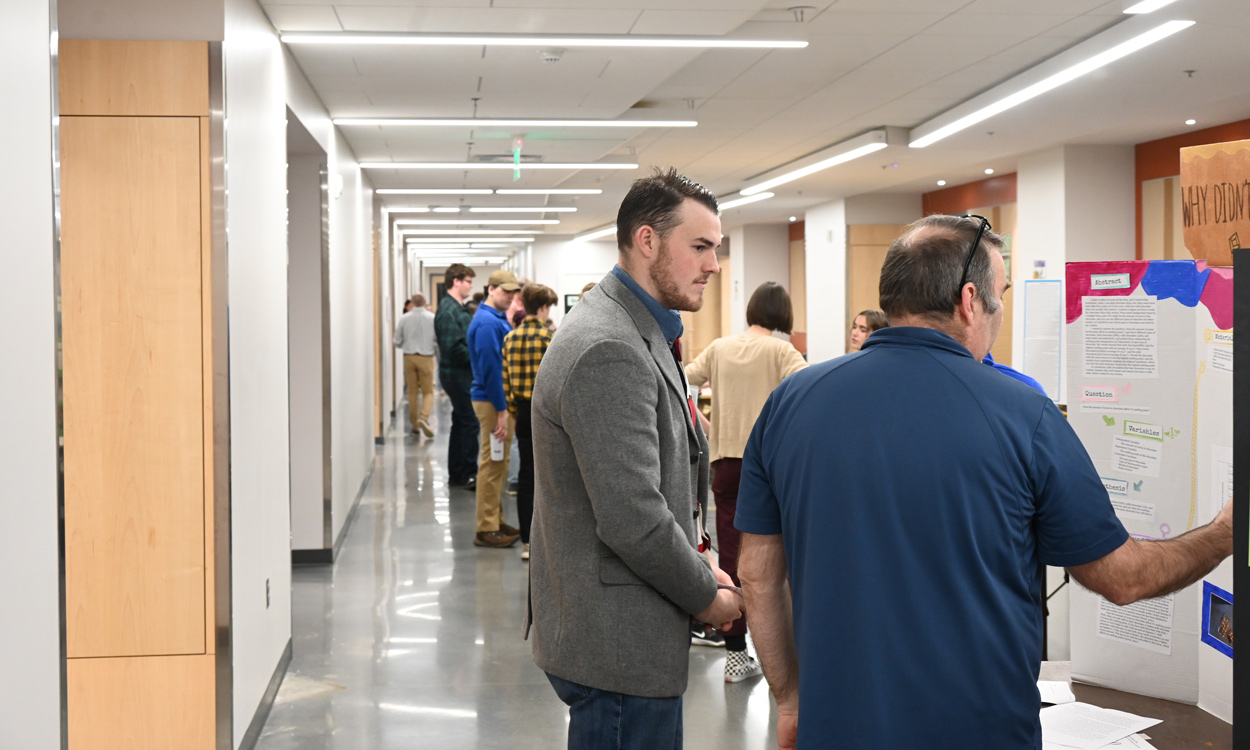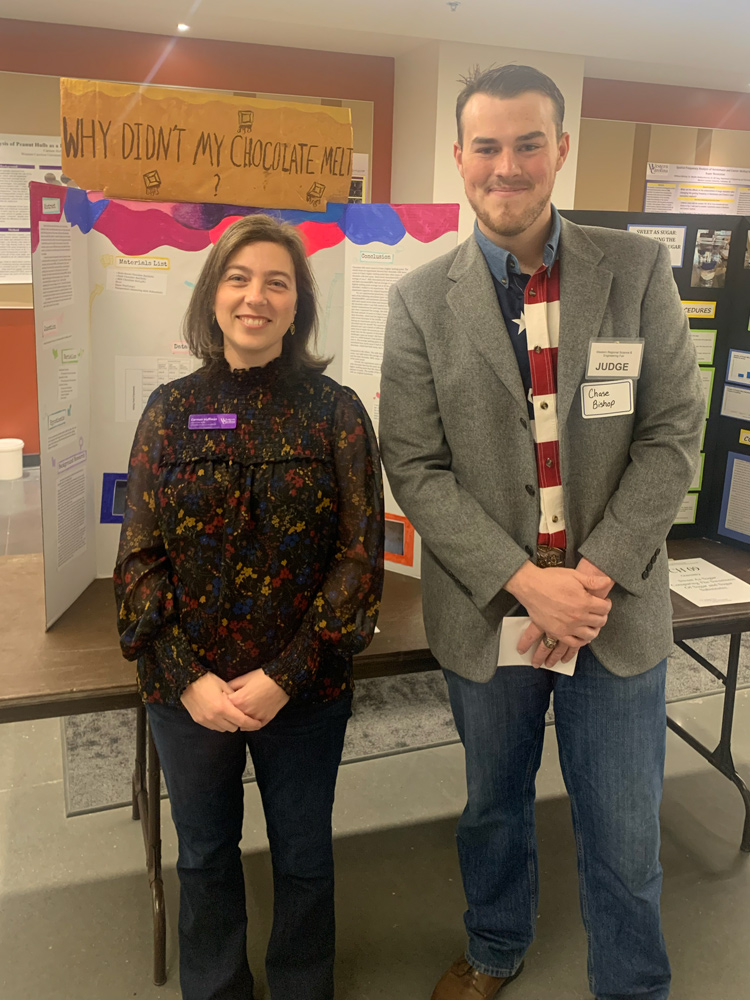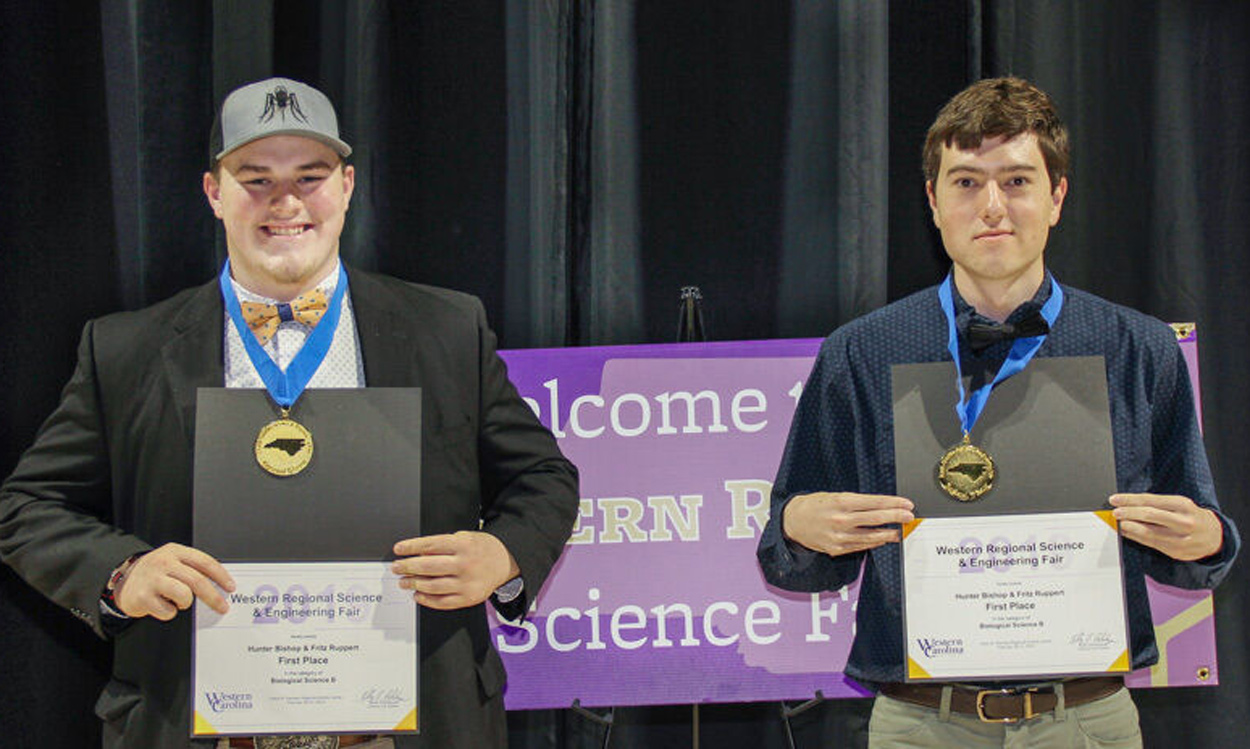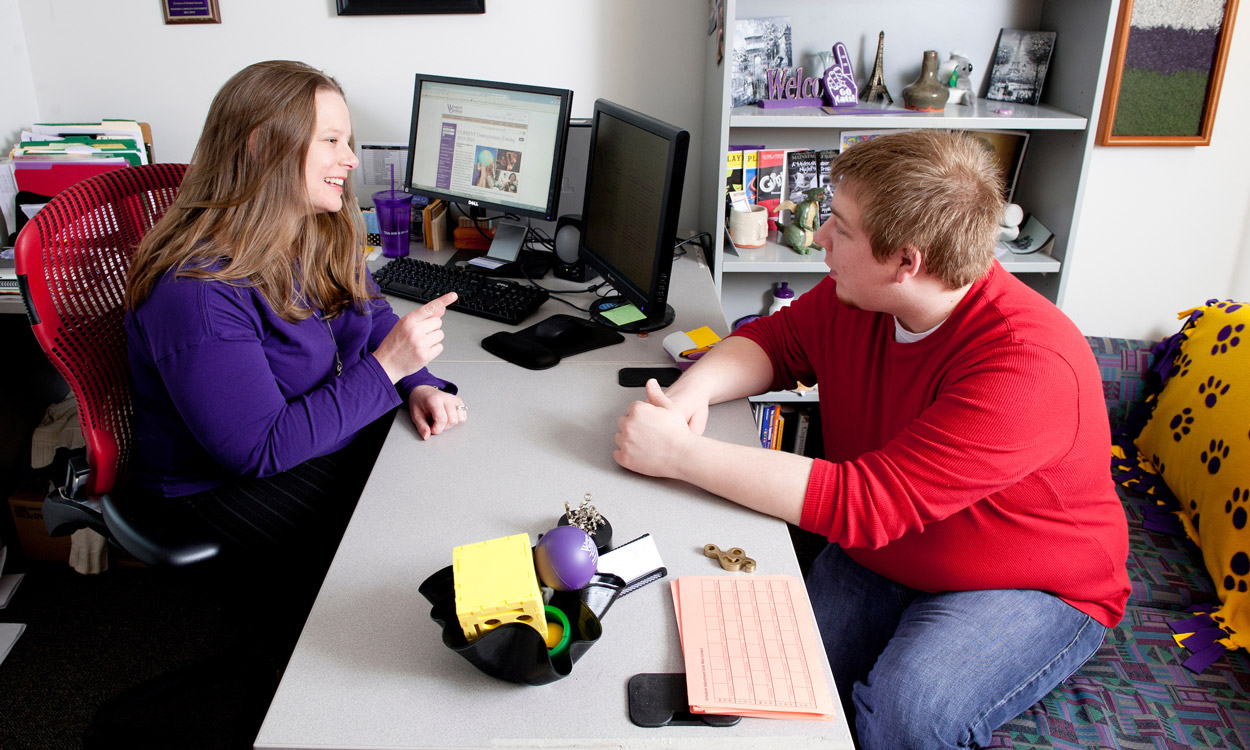Senior Chase Bishop experiences full circle moment as judge in Western Regional Science Fair
By Brooklyn Brown

After winning WCU's regional science fair as a youngster, senior Chase Bishop (left) was a judge at this year's event.
In the fifth grade, Chase Bishop participated in the Western Regional Science Fair for the first time at Western Carolina University, and his journey as a scientist began.
Bishop is now a senior at WCU with a major in chemistry and a minor in environmental health. Bishop will continue at WCU earning his masters through the ABM track in chemistry, which allows selected students to complete the requirements for both bachelor’s and master’s degrees in an accelerated time frame. After finishing his master’s program, Bishop plans to work at Pisgah Labs, a pharmaceutical manufacturing company where he has worked since his senior year of high school.
It was at his first regional science fair that Bishop fell in love with science. He vividly remembers watching Carmen Huffman, now associate dean of the College of Arts and Sciences, perform a chemistry magic show.
“I remember I even went up to her and talked to her afterwards because she had spilled liquid nitrogen on the floor and I thought it was so cool,” Bishop said.

Carmen Huffman (left) and Chase Bishop.
It was more than just the cool tricks that inspired Bishop to dive deeper into science. “I enjoyed Dr. Huffman’s enthusiasm in showing that science could be fun. There is a whole wide world of fun to be had in the sciences,” Bishop said. “Chemistry is mixing all these different things, applying what you know and making something new. It’s not magic, but it’s as close as you can get.”
Huffman began performing the magic show in her first year at WCU. “One of my predecessors, Roger Bacon, had been doing it for a while. We did it together for a year before he retired and I took the reins.” Huffman has passed the magic show torch on since stepping into her administrative role.
“One of the goals of the chemistry magic show is to just engender an excitement and a joy that comes from doing science,” Huffman said. “To know that was a starting place for Chase is super exciting for me. It feels like that full circle piece; Like we did our jobs and made the impact we are always hoping to make with the science show and the science fair.”
Bishop fully credits the science fair with carving out the path for his future as a Catamount. “If it hadn’t been for science fairs, I doubt I would be in the sciences, and if it hadn’t been for the regional science fair, I doubt I would be at Western,” he said. “When it came time to decide what college I was going to I was like, ‘I know Western.’ I even already knew some of the professors.”
Bishop did research with Brian Byrd during his junior and senior year at Brevard High School on mosquitoes. Byrd is one of the world's leading experts on mosquitoes, specifically through his work on La Crosse encephalitis.
It was Bishop’s research with Byrd that earned him first and second place at the state science fairs and two trips to the international science fair. In his junior year, Bishop and his lab partner studied different sound frequencies to repel mosquitoes. In their senior project, the high schoolers discovered that the species of mosquito they studied had magnetoreception, meaning the insect can detect magnetic fields.
“We were only the second group of researchers to have ever studied magnetoreception in mosquitoes,” Bishop said. “We were able to meet the lead researcher who had done the original paper 20 years prior, Dr. Dan Strickman.”
Bishop is extremely familiar with the other side of the judging table, but this year was his first year as a judge, and he underwent a change in perspective.
“It definitely gives a different perspective on how the judging process works,” he said. “You think one project is going to be number one, and then you speak to someone who may not have had the most appealing project just looking at it, but their presentation and enthusiasm is what makes the project come to life. How you share your science is important. I really enjoyed being a judge and having my opinions changed by the students.

Chase Bishop (left) participated in WCU's regional science fair in middle school and high school.
Bishop also credits Brevard High School’s TIME Science program with enhancing his love for science throughout high school and giving him and his classmates a place to compete and do high level research. “We were doing grad school level research in high school,” Bishop said. “It was one of the greatest programs I have ever seen at any high school because it allows students to dive deep into the science world. Jennifer Williams, who is now the chair of science at NCSSM-Morganton, has had such a profound impact on my life. And Matthew Tuckey and Laura Patch. I can’t praise them enough.”
This year’s Western Regional Science Fair had a change of venue from WCU’s Ramsey Regional Activity Center to the Apodaca Science Building. “We are housing the science fair in the Apodaca Science Building for the first time. It’s an opportunity to bring students into a real, scientific place,” said Huffman.
Both Huffman and Bishop hope that the science fair will continue to be a staple event at WCU. “It brings students together, on a college campus and in a science setting. It helps students visualize what their future could be,” Huffman said.
Below is the first, second and third place winners in each category at this year's year’s Region 8 Western Regional Science and Engineering Fair:
Elementary Division, grades 3-5:
Elementary Biological Sciences
First place: “Coffee Time,” Lillian Jones, Hendersonville Elementary School; second
place: “Which Water is Best for Plants?” Jackson Bufalino, Hendersonville Elementary
School; third place: “Does Vinegar Kill Bacteria?” Boone Brown and Beachler Hensley,
The Learning Community School.
Elementary Chemistry
First place: “Chocolate Temper Tantrum,”Clara Shea, Asheville Catholic School; second
place: “Can You Make Jello Glow: And if So Would You Eat It?” Addison Menickelli,
Cullowhee Valley Elementary School.
Elementary Earth and Environmental Science
First place: “Acid Rain: Good or Bad,” Sahana Sethi-Brown and Josephine Tressler,
The Learning Community School; Second place: “Floating Art,” Zoe Dolan, Cullowhee
Valley Elementary School; third place: “Will Separated Light Grow Plants?” Miles Brackett,
Hendersonville Elementary School.
Elementary Engineering and Technology
First place: “Neodymium Car,” Sam Cain, Hendersonville Elementary School; second place:
“Bluetooth Reflection and Refraction,” Luke Beardsley, Asheville Catholic School;
third place: “Which Glove or Mitten will Stay the Warmest in Cold Weather?” Aubrey
Salmond and Josephine Walawender, Cullowhee Valley Elementary School.
Elementary Physics and Math
First place: “What Type of Paper Makes the Best Paper Airplane,” Blake Mueller, Asheville
Catholic School; second place: “Statistics of a Dice Roll,” Julianna Hoffert, Asheville
Catholic School; third place: “Testing the Strengths of Different Magnets,” Ben Hartley,
Asheville Catholic School.
Junior Division, grades 6-8:
Junior Biological Science A
First place: “How High is Your Confidence?” Sophia Brown, French Broad River Academy;
second place: “Exercise and the Brain,” Abram Graning, Cullowhee Valley Elementary
School; third place: The Impact of Coffee on Energy Levels,” Avery Mueller, Asheville
Catholic School.
Junior Biological B
First place: “Which Common Fruit Gives The Quickest Energy Boost?” Josie L’eglise,
French Broad River Academy; second place: “Salt Preference and Blood Pressure in Kids,”
Elizabeth Volk and Julia Volk, Asheville Catholic School; third place: “Gatorade:
The Ultimate Thirst Quencher…Or Is It?” VirginiaMay Taylor, French Broad River Academy.
Junior Chemistry
First place: “Why Does The Ice Cream In A Baked Alaska Not Melt When Put Into The
Oven?” Laszlo Gazzano-Stern, Asheville Catholic School; second place: “Oxidation Nation:
Enzymatic Browning,” Maya Koufacos and Rennie Taylor, The Learning Community School;
third place: “Electrifying Electrolytes,” Bennett Cary, The Learning Community School.
Junior Earth and Environmental Science
First place: “Grey to Green,” Bailey Estes, The Learning Community School; second
place: “The Way to Grow,” Charles Palmeri, Asheville Catholic School; third place:
“How Clean Is The French Broad River Water And What Is The Best Way To Clean It?”
Luke Martin, Asheville Catholic School.
Junior Engineering
First place: “Lure Retrieval System,” Asher Merritt, Macon Middle School; second place:
“Do Biplanes or Monoplanes Fly Better?” Jakob Vigue, Asheville Catholic School; third
place: “Do Curved Blades or Bent Blades Produce More Electricity?”Brady Vigue, Asheville
Catholic School.
Junior Math, Statistics, Data Science
First place: “Data Seeds,” Ella Hoffert, Asheville Catholic School; second place:
“Does the Type of Milk Impact the Sogginess of the Cereal?” Garret Chapman, Cullowhee
Valley Elementary School; third place: “What type of marker is the most sustainable?”
Lucy Brown, Cullowhee Valley Elementary School.
Junior Physics
First place: “Time to Become Bat-Men,” Collin Gilliland, Kevin Mendez-Reynoso and
Thomas Secretarski, Asheville Catholic School; second place: “Constant Curiosity,”
Joaquin Martinez, Asheville Catholic School; third place: “The Effect of Temperature
on Surface Tension,”
Zachariah Gibson, Macon Middle School.
Junior Technology
First place: “Can Thermal Cameras Make the Road Safer?” Owen Beardsley, Asheville
Catholic School; second place: “The Beat Goes On,” Emily Barr and Jacob Barr, Asheville
Catholic School.
Senior Division, grades 9-12
Senior Biological Science A
First place: “Screening for the Presence of Glyphosate in GMO and non-GMO Products,”
Savannah Kennedy, Fletcher Academy; second place: “What Plants Want - The Effects
of Water Sources on Plant Growth,” Chaniya Bryant, Swain County High School.
Senior Biological Science B
First place: “The Effects of Bias on Human Decision Making,” Maximus Wilmot, Swain
County High School.
Senior Earth and Environmental Science
First place: What's in the Water? “Variations in the Constituents of Different Water
Sources,” Grace Schuler, Swain County High School.
Senior Engineering
First place: “Developing a Nozzle Design to Minimize Powder Dispersion,” Brendan Henson,
Hendersonville High School.
For more information about the Region 8 Western Regional Science and Engineering Fair, visit sciencefair.wcu.edu or contact Educational Outreach at 828-227-7397.

